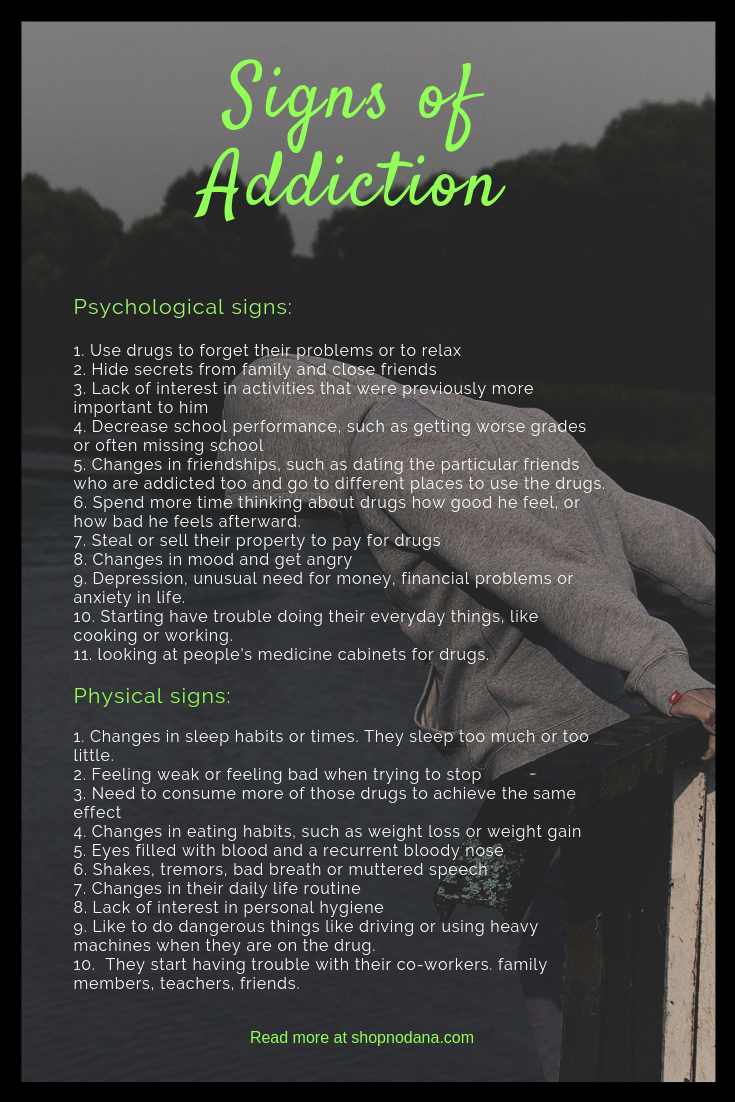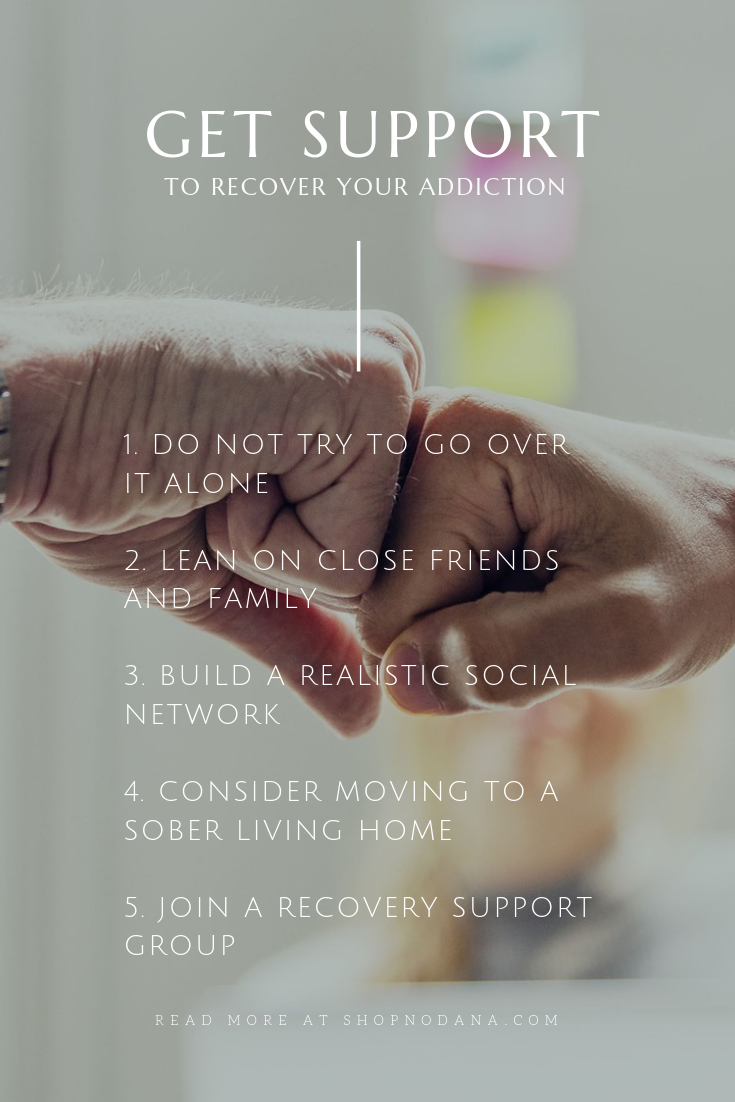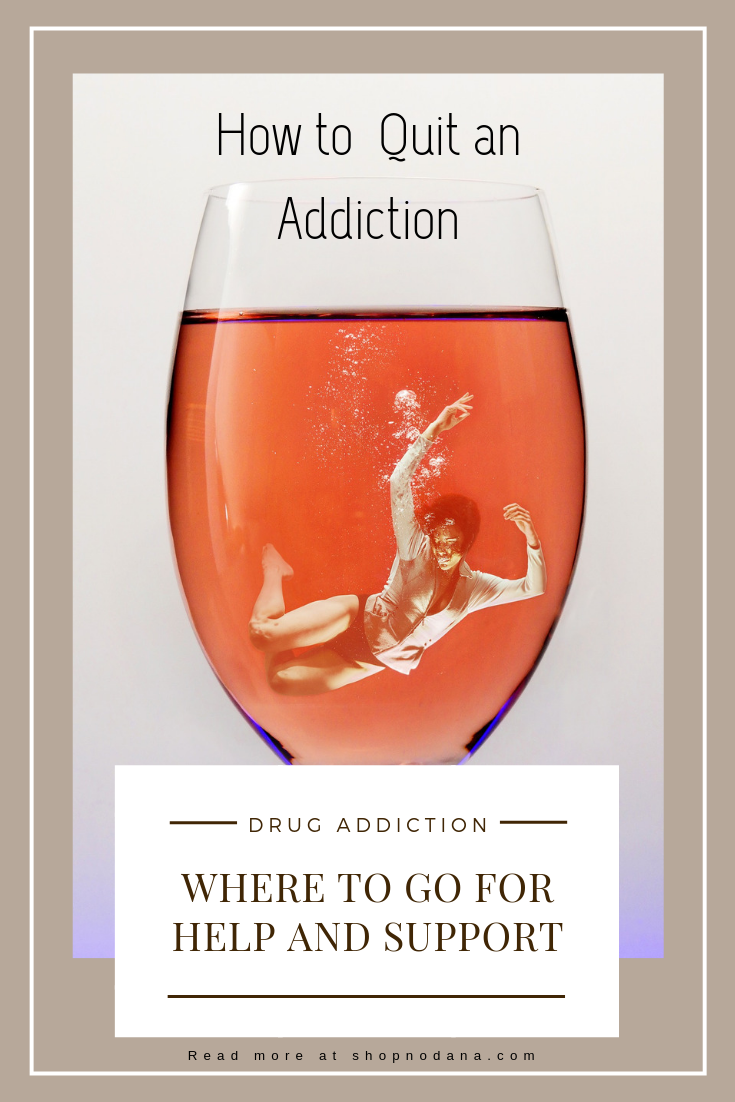How to overcome addiction- Proven ways to control relapse
Do you know what is your addiction? If you are dealing with alcoholism, tobacco, po*rnography, phone addiction, drugs, lying, or gambling, admitting that you have a problem is always the first step to overcome your addictions, and unfortunately, that is not so easy. Now is the time to plan a compromise, ask for help, and prepare yourself for the obstacles you will surely face. If you want to know how to overcome addiction and get rid of these habits to start a new life to the fullest again, continue reading.
What is an addiction?
Addiction is a compulsive behavior that is difficult to control. It is something we constantly think about and obsess over it interferes with our social relationships and threatens to take over our lives. Addiction means that a person can not control his desire to take a drug or drink. A cocaine addict has become so familiar with the drug that he can not stop using it. It can be physical, psychological or both.
It is a behavior that we rely on to a degree that helps us change our emotional state and meet our inner desires and drives. It is a behavior that gives us a sense of security and control.
When we indulge in our addiction, they cast a shadow over our priorities, commitments and other responsibilities towards ourselves, our families, our colleagues, and our friends. This addiction dominates our lives and affects our work, our health, and our social life.
How does addiction usually arise?
Addiction is evident in our lives in many ways. People, for example, indulge in alcoholism, food addiction, television addiction, Mobile phone addiction, video game addiction, gambling addiction, sex addiction, child po*rnography, work addiction, shopping addiction, social media addiction, and addiction to storage. But not limited to. All these addictions arise from specific living conditions that lead to mandatory behaviors.
Addiction, for example, can arise from unexpected social, emotional, or environmental pressures. Sudden changes in our environment, family circumstances or working conditions may threaten our comfort, security, and way of life. When we are under threat, we give in to painful feelings that prevent us from dealing with the situation in ideal ways.
Low self-esteem, and a strong desire to reduce anxiety and stress, push us toward the compulsive habits and behaviors that we use as a mechanism to overcome uncertainties in life. These behaviors give us a sense of control while redirecting our attention away from our problems.
Sometimes, it may arise because of the desire to feel important or agree with our surroundings. We want to win people and be accepted as part of a community or group, and as a result, we indulge in behaviors that we feel will help us win the approval of others.
Physical Addiction
Being physically addicted means that someone’s body depends on a particular substance. It also increases the person’s tolerance to that substance, so that the person needs an increased dose to get the same effect. Someone who is physically addicted and stops using a substance, such as drugs, alcohol or tobacco, suffers from withdrawal syndrome. Some symptoms of withdrawal syndrome include diarrhea, tremors, and generally poor feeling.
Psychological Addiction
Psychological addiction occurs when the desire to take medication is psychological or emotional. Psychologically addicted people feel that the desire to take medication is beyond them. They can lie and even steal to get them.
A person crosses the dividing line separating consumption from dependency when the drug is no longer used for entertainment or “to put itself”, but it is becoming dependent on it. His life focused on his need for medicine. A person who is addicted – whether he has physical or psychological addiction or both – feels that he cannot stop taking drugs.
Signs of addiction
A sign of addiction is the need to take a particular drug or substance. However, there are many other signs that can suggest potential addiction, such as mood swings, weight loss or weight gain. (Although these signs may also refer to other problems, such as depression or eating disorders).
Signs that indicate that you or someone you know have an addition:
Psychological signs:
1. Use drugs to forget their problems or to relax
2. Hide secrets from family and close friends
3. Lack of interest in activities that were previously more important to him
4. Decrease school performance, such as getting worse grades or often missing school
5. Changes in friendships, such as dating the particular friends who are addicted too and go to different places to use the drugs.
6. Spend more time thinking about drugs how good he feel, or how bad he feels afterward.
7. Steal or sell their property to pay for drugs
8. Changes in mood and get angry
9. Depression, unusual need for money, financial problems or anxiety in life.
10. Starting have trouble doing their everyday things, like cooking or working.
11. looking at people’s medicine cabinets for drugs.
Physical signs:
1. Changes in sleep habits or times. They sleep too much or too little.
2. Feeling weak or feeling bad when trying to stop
3. Need to consume more of those drugs to achieve the same effect
4. Changes in eating habits, such as weight loss or weight gain
5. Eyes filled with blood and a recurrent bloody nose
6. Shakes, tremors, bad breath or muttered speech
7. Changes in their daily life routine
8. Lack of interest in personal hygiene
9. Like to do dangerous things like driving or using heavy machines when they are on the drug.
10. They start having trouble with their co-workers. family members, teachers, friends.
Get help
If you think you are addicted to drugs or alcohol, realizing that you have a problem is the first step in getting help.
Many people think they can overcome the problem on their own, but that does not work in most cases. Look for someone you trust to talk to. For starters, this can help you talk to a friend or someone of your age, but the best way to get help is to talk to an adult who can support and understand you. If you can not talk to your parents, you can talk to your school counselor, relative, doctor, favorite teacher, or pastor.
Unfortunately, overcoming addiction is not easy. Leaving drugs or alcohol is one of the hardest things you’ve ever done in your life. It is not a sign of weakness that you need professional help from an addiction counselor or therapist. Most people who can quit drugs or alcohol need specialized help or treatment to do this.
Decide to Make a Change in your life
If you are addicted to a prescription drug, you may be concerned about how to find an alternative way to treat your medical condition. It’s okay to feel torn. Commitment to complacency involves changing many things, including:
1. The way you deal with stress
2. Which you allow in your life
3. What do you do in your free time
4. How to think about yourself
5. Prescription and over-the-counter medications you are taking
It is also natural to be upset about giving up the medicine you choose, even when you know it is causing problems in your life. Recovery requires time, motivation and support, but by adhering to change, you can overcome your addiction and regain control of your life.
1. Keep track of your drug abuse, including when and how much you are using. This will give you a better sense of the role addiction plays in your life.
2. Indicate the pros and cons of quitting smoking as well as the costs and benefits of continuing drug abuse.
3. Think of things that interest you, such as your partner, your children, your pets, your career, or your health. How does drug abuse affect those things?
4. Ask someone you trust about their feelings about drug abuse.
5. Ask yourself if there is anything preventing you from changing. What can help you make the change?
Preparation for change: 5 basic steps to overcome addiction
1. Remind yourself of the reasons you want to change.
2. Consider your previous attempts to recover, if any. what worked the best? what didn’t?
3. Identify specific and measurable targets, such as the start date or the limits of your use of drugs.
4. Remove the triggers of your addiction from your home, workplace, and other places.
5. Ask for support from your family and friends and tell them that you want to recover.
Get support to recover your addiction:
Do not try to go over it alone –
Never do it alone- lend a helping hand or seek support from others. Whatever method of treatment you choose, having positive effects and a strong support system is essential. The more people you can use to encourage, guide, and listen to, the better your chances of healing.
Lean on close friends and family-
Getting support from friends and family members is an invaluable asset in recovery. If you do not want to turn to your loved ones because you have failed them before, consider going to Relationship Counseling or Family Therapy.
Build a realistic social network-
If your previous social life revolves around drugs, you may need to make some new links. It is important to have strong friends who support your recovery. Try to take a semester, join a church or civic group, volunteer or attend events in your community.
Consider moving to a sober living home-
Safe living quarters provide a safe and supportive place to live while recovering from drug addiction. It’s a good option if you do not have a stable home or a drug-free living environment.
Join a Recovery Support Group-
Join the Recovery Support Group as a 12-step program and attend meetings regularly. Spending some time with people who understand exactly what you are going through can be very healing. You can also take advantage of the shared experiences of group members and see what others have done to stay alert.
Explore addiction treatment options:
How to overcome addiction? Once you committed to recovery, it is time to explore addiction treatment options. Although the treatment of addiction can vary according to a particular drug, the successful program often includes different elements, such as:
Detoxification
Usually, the first step is to cleanse your body of medication and manage withdrawal symptoms.
Behavioral guidance
Individual, group, or family therapy can help you identify the root causes of drug addiction, repair your relationships, and learn healthy and smart coping skills.
Medication
The drug can be used to manage withdrawal symptoms, prevent relapse, or treat any common mental health condition such as depression or anxiety.
Long-term follow-up
It can help prevent relapse and maintain serenity. This may include attending personal support groups or online meetings to help keep the right track.
Types of drug treatment programs:
Residential treatment –
Residential treatment includes living during a facility, obtaining off from work, school, family, friends and away from all the addiction triggers whereas undergoing intensive treatment. This treatment provides care 24 hours a day, generally in non-hospital settings.
Residential treatment can last from a few days to many months. The treatment is extremely structured and designed to assist residents to examine harmful beliefs, self-concepts, damaging patterns of behavior and adopt new, a lot of consistent and constructive ways in which to act with others.
Partial hospitalization is for people who require continuous medical observation but who wish to live at home and have a stable living environment.
These treatment programs usually meet in a treatment center for 7 to 8 hours during the day and then return home at night.
Outpatient treatment –
It is not a direct therapy program, these outpatient programs can be scheduled around work or school. You are treated during the day or evening but you do not stay overnight. The main focus is on preventing relapse.
Lively living communities –
Living in a resin home usually follows an intensive treatment program such as residential treatment. You live with different addicts in a safe and sober atmosphere.
Durable living facilities are useful if you do not have a place to go or you are worried that returning home too early will lead to relapse.
Keys to find the best addiction treatment that is perfect for you
No certain recovery plan works for everyone. Everyone’s needs are different. Whether you have a problem with illegal or prescription drugs, you should customize your addiction treatment according to your unique situation. It is important to find a program that is suitable only for you.
Treatment must be treated more than just drug abuse. If you want to know how to overcome the addiction you might realize addiction affects your entire life, including your relationships, your profession, your health, and your psychological well-being.
The success of treatment depends on developing a new way of living and addressing the causes of your drug transition in the first place. For example, your dependence on drugs may have evolved from the desire to manage pain or overcome tension, in which case you will need to find a healthy way to relieve pain or deal with stressful situations.
Commitment and follow-up are key. Treating drug addiction is not a quick and easy process. In general, the longer the drug use, the more treatment you need. In all cases, long-term follow-up care is essential for recovery.
There are many places to go for help. Not everyone requires detoxification under medical supervision or a long period of rehabilitation. The care you need depends on a variety of factors, including age, history of drug abuse, or medical or psychological conditions. In addition to doctors and psychologists, many clerics, social workers, and counselors offer addiction treatment services.
Substance abuse and mental health. As you seek help in drug addiction, it is also important to seek treatment for any other medical or psychological problems that you are facing. Your best chance of healing is to have a community mental health and addiction treatment from the same provider or team.
Where to go for help and support
Most of these programs have chapters around the world:
Narcotics anonymous world services
Crystal Meth Anonymous world services
Marijuana Anonymous world services
Cocaine Anonymous world services
Professional help to treat drug addiction and recovery
In the United States of America:
Contact the Substance Abuse and Mental health Service Administration or contact the SAMHSA helpline at 1-800-662-4357.
Or contact with Get One-on-One Help to Address Your Child’s Substance. You can call the Partnership for Drug-Free Kids helpline at 1-855-378-4373 or send a text message to 55753 to begin getting personalized help from them.
In the UK:
Contact with NHS drug additions support services. You can call the Frank helpline at 0800 776600.
In Canada:
Get support from Canadian Center on Substance Use and Addiction.
Address- 75 Albert Street, Suite 500, Ottawa, ON, K1P 5E7, Canada
Toll-free: 1-833-235-4048
Phone: 613-235-4048
In Australia:
Contact with Australian Government Department of Health.
In South Africa:
Contact with Western Cape Government substance abuse treatment Centers.
Or you can contact with SANCA ( South African National Council on Alcoholism and Drug Dependence)
To get quick support for Addiction Treatment and Recovery you can also contact with Rehab Cape Town
Address :
5 MELROSE WALK CLAREMONT CAPE TOWN,
7708 WESTERN CAPE SOUTH AFRICA
You can call- 0844 LIVING (0844 548464)
Do not let the relapse keep you down
Relapse is a common and normal status of addiction treatment and recovery process. Although relapse is frustrating and disappointing, it can be an opportunity to learn from your mistakes, identify additional factors, and adjust the course of treatment.
What causes a relapse?
Different “triggers” can put people at risk of relapse into old patterns of drug abuse. The causes of relapse can vary for each person. Some common ones include:
1. Your negative emotional states can make it (such as anger, sadness, trauma, or stress)
2. Physical discomfort (such as withdrawal symptoms or physical pain)
3. Positive emotional states (desire to feel better)
4. Personal control test (“I only get one pill”)
5. Strong temptations or urges (cravings)
6. Conflict with your beloved one (such as an argument with a spouse or partner)
7. Social pressures to use (situations that appear to be anyone else using drugs)
8. Fun times with others (like having fun with friends or family)
Source: CAMH( Addiction and Mental Health Center)
The important thing to remember is that relapse does not mean the failure of the drug treatment. Do not give up, call your care, talk to your therapist, go to a meeting, or make an appointment with your doctor.
When you are awake again and out of danger, look at what triggered the relapse in you, what went wrong, what you could do differently. You can choose to return to the recovery path and use the experience to enhance your commitment.
8 Signs You’re Addicted to Sugar-How to Stop Sugar Craving
Breast Enlargement- Best Home Remedies To Increase Breast Size Naturally
10 Most Common Baby Illnesses That You Can Treat Naturally
Apple Cider Vinegar Foot Soak-What happens if you soak your feet in ACV?




